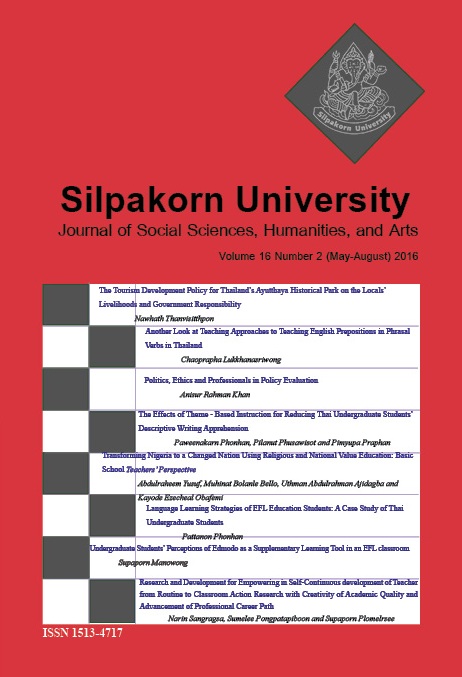Another Look at Teaching Approaches to Teaching English Prepositions in Phrasal Verbs in Thailand
Main Article Content
Abstract
This paper aims to compare the differences between the
“Communicative Approach” and the “Cognitive Approach” to teaching
English prepositions in phrasal verbs in Thailand. The benefits and
limitations of both approaches as identified and analyzed in previously
conducted research both in Thailand and abroad are addressed in this
paper. The author suggests that teachers should apply both the “Communicative Approach” and the “Cognitive Approach” to teaching English
prepositions in phrasal verbs to Thai learners of English. Students can
learn English prepositions in phrasal verbs implicitly through schemas
in their minds and they can practice communicative skills by performing
assigned tasks.
Downloads
Article Details
All rights reserved. Apart from citations for the purposes of research, private study, or criticism and review,no part of this publication may be reproduced, stored or transmitted in any other form without prior written permission by the publisher.
References
Ahmad, S. and Rao, C. (2013) Applying in Teaching English as a Foreign Language: A Case Study of Pakistan. Porta Linguarum 20: 187-203.
Bagaric, V. (2007) Defining Communicative Competence. Metodika 8(1): 94-103.
Bennui, P. (2008) A Study of L1Interference in the Writing of Thai EFL Students. Malaysian Journal of ELT Research 4: 72-102.
Buyukkarci, K. (2010) Teaching Phrasal Verbs through Communicative Approach. Sosyal Bilimler Enstitusu dergisi Journal of the Institute of Social Sciences 5: 11-20.
Efrizal, D. (2012) Improving Students’ Speaking through Communicative Language Teaching Method at Mts Ja-alhaq, Sentot Ali Basa Islamic Boarding School of Bengkutu, Indonesia. International Journal of Humanities and Social Science 2(20): 127-134.
Ellis, R. (1990) An Integrated Theory of Instructed Second Language Learning. Instructed Second Language Acquisition. Oxford: Blackwell.
Ellis, R. (2003) Task-based Language Learning and Teaching. Oxford: Oxford University Press.
Fotos, S. and Ellis, R. (1991) Communicating about Grammar: A Task-based Approach. TESOL Quarterly 25(4): 605-628.
Ganji, M. (2011) The Best Way to Teach Phrasal Verbs: Translation, Sentential Contextualization or Metaphorical Conceptualiza-tion? Theory and Practice in Language Studies 1(11): 1497-1506.
Indrambarya, K. (1995) Are there Prepositions in Thai? In Papers from the Third Annual Meeting of the Southeast Asian Linguistic Society 1993, at the University of Hawaii, edited by Alves, M., pp. 101-117. Arizona: Arizona State University Press.
Kellerman, E. and Smith, S. (1986) Crosslinguistic Influence in Second Language Acquisition. Oxford: Pergamon Institute of English.
Khumbangly, N. (2005) Achievement in Learning English Phrasal Verbs through the Instruction of Adverb Particle Meanings: A Case of Off, Out, and Up. MA Thesis, Thammasat University, Bangkok, Thailand.
Lee, H. (2012) Concept-Based Approach to Second Language Teaching and Learning: Cognitive Linguistics-Inspired Instruction of English Phrasal Verbs. Ph.D. dissertation, The Pennsylvania State University, Pennsylvania, United States
Littlewood, W. (1998) Communicative Language Teaching. Cambridge: Cambridge University Press.
Long, M. H. (1991) Focus on Form: A Design Feature in Language Teaching Methodology. In Foreign language research in cross-cultural perspective, edited by K. Debot, pp. 39-52. Amsterdum: John benjamins.
Nunan, D. (1989) Designing Tasks for the Communicative Classroom. Cambridge: Cambridge university press.
Pawapatcharaudom, R. (2007) An Investigation of Thai Students’ English Language Problems and Their Learning Strategies in the International Program at Mahidol University. MA Thesis, King Mongkut’s Institute of Technology North Bangkok, Bangkok, Thailand.
Pongpairoj, N. (2002) Thai University Undergraduates’ Errors in English writing. Journal of Languages and Linguistics 20(2): 66-99.
Pongsai, P. (2010) Teaching Phrasal Verbs by Using English Songs. MA Thesis, Ubon Ratchathani Rajabhat University, Ubon Ratcha-thani, Thailand.
Richards, J. C. (2006) Communicative Language Teaching Today. New York: Cambridge University Press.
Schmidt, R. (2010) Attention, Awareness, and Individual Differences in Language Learning. In Proceedings of CLASIC 2010, edited by W. M. Chan, S. Chi, K. N. Cin, J. Istanto, M. Nagami, J. W. Sew, T. Suthiwan, and I. Walker, pp. 721-737, Singapore, December 2-4. Singapore: National University of Singapore, Centre for Language Studies.
Thibeau, T. J. (1999) English Prepositions in Phrasal Verbs: A Study in Second Language Acquisition. Ph. D. Dissertation, The University of Arizona, Arizona, United States.
Tongpoon, A., et al. (2011) The Development of Grammar CALL Courseware on Phrasal Verbs for First Year English Major Students, Khon Kaen University. KKU Research Journal Graduate Study 1(2): 1-9.
Waehayi, W. (2012) Effectiveness of Conceptual Metaphor Technique in Teaching Phrasal Verbs. MA Thesis, Prince of Songkla University, Songkla,Thailand (Thai Reference).
Warotamasikkhadit, U. (1990) There Are No Prepositions in Thai. Paper presented at the Sino-Tibeton Conference, Bangkok.
Watcharapunyawong, S. and Usaha, S. (2013) Thai EFL Students’ Writing Errors in Different Text Types: The Interference of the First Language. English Language Teaching 6(1): 67-78.
White, B. J. (2012) A Conceptual Approach to the Instruction of Phrasal Verbs. The Modern Language Journal 96(3): 419-438.
Whong, M. (2011) Language Teaching Linguistic Theory in Practice. Edinburgh: Edinburgh University Press.


